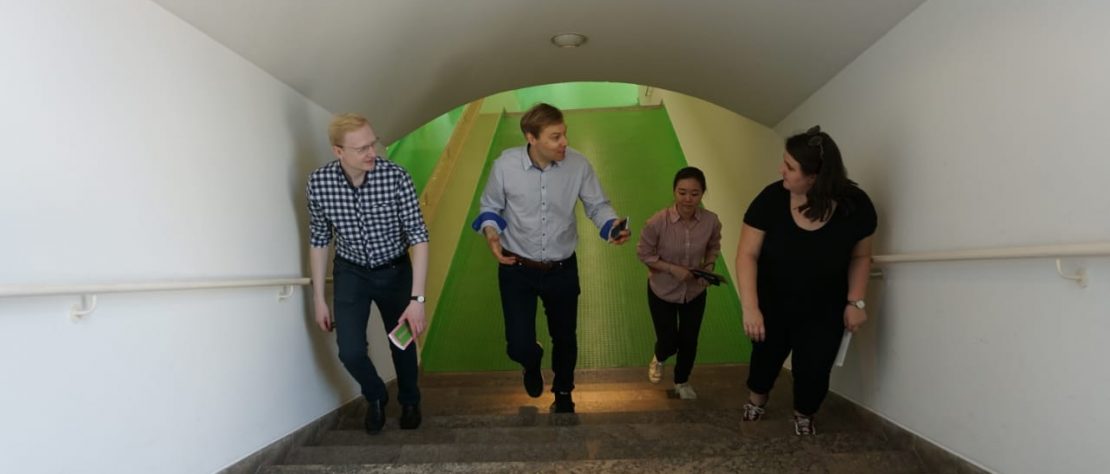Pre-Departure:
My exchange preparation was somewhat different, since it was the first time someone was doing the Engineering Gap Year in Germany – a whole academic year in Germany, one semester studying at a host university and one semester doing an internship at a German company. I do recommend really putting thought into your motivation letter – it really helped me sort out what I wanted to gain from this experience, and these goals served as a reminder at times when I doubted my decision.
(And those moments will come – moments where you think “What on earth am I thinking, extending my studies by a whole year to go to a strange country all by myself?” Rest assured that this is normal and, at least in my experience, once you’re there and in the thick of things, you won’t believe that you ever doubted that it was the right decision.)
Professor Schreve at the Department of Mechanical and Mechatronic Engineering put me in contact with Max Alber, who works in the International Office at RU. Mr Alber answered all my questions and was very helpful, all before I even started the official application process. He also guided me through the application process itself, and helped me to find funding opportunities and apply for the bursary I ended up getting. (The Baden-Württemberg Stipendium, a stipend of 600 Euro per month for five months.) I urge you to use all the resources presented to you – ask any and all questions, there are people in place to help you, you don’t have to do this all by yourself. The application process was quite simple, an online application form that was very clear. I also had to apply for university accommodation (which I highly recommend – it’s by far the cheapest option available, and a great way to meet new people and be exposed to different cultures) before I could apply for my visa.
The visa application was a lot less daunting than I thought it would be. SU International directed me to a web page (https://southafrica.diplo.de/sa-en/sa-consular/sa-studyvisa/498290) that detailed the exact documents I would need to apply, and I simply made a checklist of these documents and spent a few days collecting them. Note that in the Original + two copies section, they want three packets of documents, not the originals and copies grouped together. If you have all your documents and your application is neat and properly structured, the process will be easy. Make sure to make your appointment for your visa application as soon as possible! They book up months in advance. Another interesting tip: because I had a bursary from a German organization, my visa application was fast-tracked (I received it within twenty-four hours of applying!) and I didn’t have to pay the application fee (75 Euro).
Other preparation (other than packing, of course!) included registering for the appropriate modules at SU, Semester Exchange 371 and Internship 393. This ensured that I could return to SU in 2019 without having to reapply. I also had to take the Statistics block course that M&M Engineering students have to take before their final year, as I would still be in Germany when the course was presented in 2019. I selected the courses I wanted to take at Reutlingen University as well. A tip concerning this, make sure that you pay attention to the semester level of the courses you select (their engineering degree has seven semesters total), because I didn’t and I ended up taking some low-level courses that, while interesting, were not as academically challenging as I was used to.
Lastly, my flight was booked and my bag was packed – it was time to go!
Experience at the Host University:
Semester 1: Academic Exchange at Reutlingen University
I arrived in Reutlingen on the first of March, a week before classes started, in time for the orientation program that the Reutlingen International Office (RIO) had planned. I recommend arriving on a week day and during working hours, to make key collection and moving in easier for everyone involved. RU has a system for international students called Student4Student, where they assign each international student a “buddy” to help them with anything they might need – mine was a seventh-semester engineering student named Katja. Katja met me at the bus station and took me to my dorm, helped me collect my key and student card, and showed me the closest place to buy groceries and other things for my room. Again, I urge you to use the resources at your disposal – I am so glad I had Katja that first day. I couldn’t understand a word the landlord was saying (he spoke a German dialect that I do not, despite being fluent in formal German) and without her I doubt I would have gotten my key as quickly as I did. Note that you have to have a physical copy of your signed contract on you to present to your landlord!
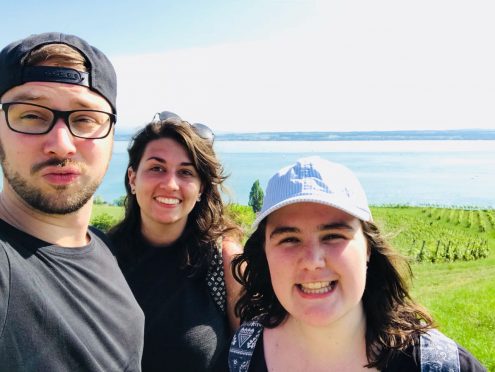
RU has a very large international student community (about 20% of their students are non-German) and they have the orientation process down to a science. They guide you through everything you need upon your arrival – you need to register at the local municipality in Reutlingen, register at the university, get German insurance if you don’t have it already, and get a semester ticket for the public transportation in the region, to name a few things. This may seem overwhelming when you look at it, but it’s all done through or with the help of RIO, and it’s done in a big group with all the other new international students. They also let you know what you need to bring for all the applications before your departure, so if you follow their instructions it’s really easy and a positive experience. In my case, I even made some friends during this process, because we were all in it together and bonded over the experience.
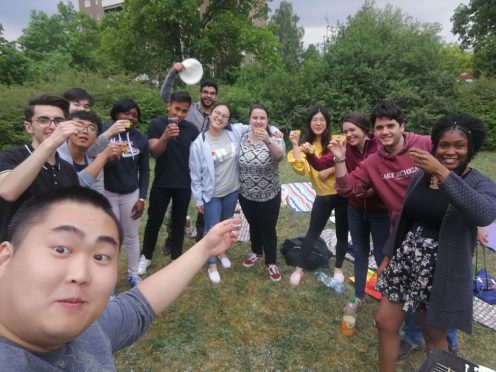
Once classes started, things calmed down considerably. I took five courses in the Engineering School at RU, as well as a German language course. I highly recommend taking some kind of German course, even if you don’t speak the language at all. The average German person speaks very little English, so even the most basic of German skills can help in your everyday life. Since I wouldn’t be transferring credits, I focused on courses with content I wouldn’t be exposed to at SU, plus one or two that would help me when I returned.
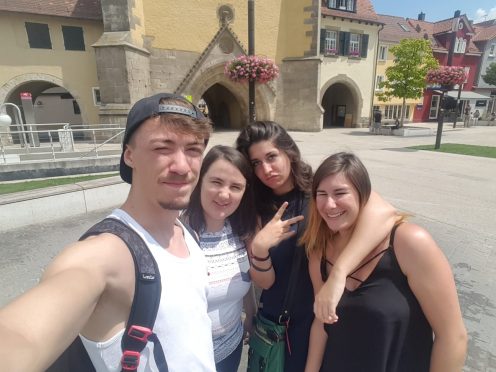
There are many differences between Reutlingen and Stellenbosch University – the most obvious being the class sizes and the assessment policies. The classes at RU are very small – my largest class had 37 people in it and the smallest less than twenty. I hadn’t realized how used to large classes I’d grown before I got here and was suddenly in these very small classes, and I’m curious to see how I’ll react when I’m back in a class of almost 200 people at SU. The assessment policy couldn’t be more different to that of the engineering faculty back home – there is almost no ongoing assessment. For Foundations of Project Leadership and Foundations of Project Planning, the only assessment was the final exam. Heat Transfer Technology and PLC Control Systems each had a pass-fail practical in addition to the final exam, and Design Methodology had only a design project and no exam at all. The German language course had a presentation and an exam. I have to say that I find SU’s policy of continuous assessment through tutorials, practicals and intermediate testing much better for retaining the information long term, even though the single-assessment approach means I got better grades.
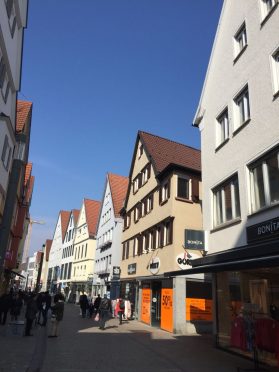
Note that registering for a module does not mean you are automatically registered for its exam RU. There is a second registration period later in the semester where you have to register for the exams you want to take. This also includes practicals – above and beyond the exam registrations, you also have to register for your practical “exam” separately, often before the exam registration deadline. Ask your lecturers about this, I was very confused and ended up registering late for a practical or two, which isn’t a crisis but still embarrassing.
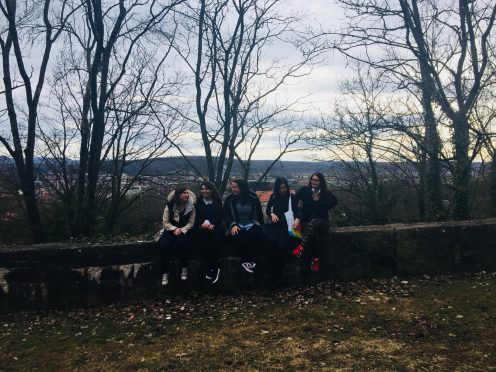
My classes were composed of both international and German students, though in two of them I was the only international student. Something else to get used to was the longer lectures – RU’s lectures are structured in blocks of ninety minutes each, and I definitely felt those last 30 minutes, especially in the first few weeks. Most of my modules had only one contact session of one block a week, which made my timetable much less full than I was used to. It also made for quite a few long weekend trips out of the country, but I’ll elaborate on that later.
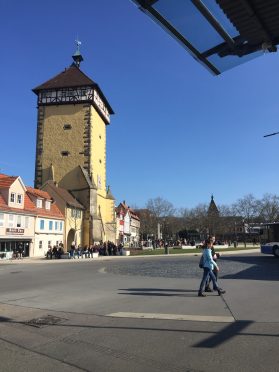
Another difference is that RU’s lecturers (at least in the engineering faculty) have to spend some time in the industry before they can teach there. It makes their approach to lecturing different, as it’s much more practical- and industry-orientated than it is academic, which of course has both positive and negative consequences.
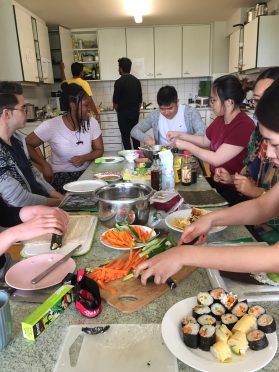
The fact that there was no continuous assessment also left me with a lot of free time during the semester, which worked out well, because RIO organized a lot of different activities. This included some excursions to nearby attractions, like the Stuttgart Spring Festival and sights in Tübingen, multiple museum visits, and activities in Reutlingen itself. One of these was a scavenger hunt throughout the whole city, meant to help us familiarize ourselves with the area, that was a lot of fun – and our team won!
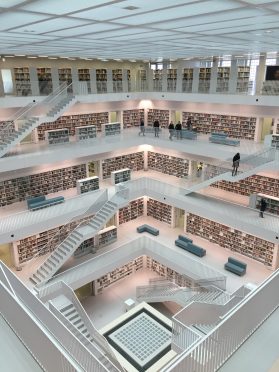
I also had the opportunity to travel outside of Germany during the first semester. My low work load and my bursary meant I could use my own money to travel, and I ended up visiting Florence (Italy), Zurich (Switzerland), Lyon and Paris (France) and Amsterdam (Netherlands) with two friends (French and American) who were also doing a semester abroad. It’s so easy and quite cheap to travel when you’re based in Germany, and apps like Flixbus, Booking.com and AirBnB make it even easier. When travelling, note that trains are faster, but buses are cheaper, and I promise you really only need one pair of shoes per trip. (No, really, don’t pack three pairs of shoes for a long weekend in Italy. You’ll only wear one and you’ll hate yourself for making your bag so heavy.)
Semester 2: Internship at Bielomatik:
I started my internship at bielomatik Leuze GmbH + Co. KG in September. I found out about them at a career fair held by the university, where their representative was happy to give me information about how to apply.
I recommend attending any career fairs or company visits that might come your way – you won’t know what’s out there if you don’t look. I had some ideas about where I wanted to work before I came to Germany, but the career fair really opened my eyes to all the options out there.
I also took a course offered by RIO – Application Training for International Students. This course was extremely helpful in helping me apply for internships, especially because the German way of setting up a CV is so different from the South African way. The course offered help with your CV, cover letter and interview skills. As mentioned, I do speak German, which made my chances of getting an internship better (or at the very least gave me more options).
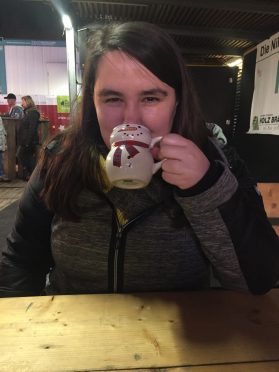
Bielomatik is a company based in Neuffen, Germany, that specializes in plastic welding systems and lubrication systems, as well as some consulting work. I was placed in the Lubrication Systems department, as an intern under their resident mechatronic engineer. The internship was certainly interesting. It was not at all what I expected, but I’m told that Bielomatik isn’t run the way a typical German engineering company is run. There was also a change in the leadership structure while I was there. I spent most of my time there working on a single project: one of their lubrication systems that they were modernizing because some of the parts were becoming unavailable soon. The program had to be rewritten and optimized for the new mechanical elements, as well as a new PLC, and that was my responsibility.
I definitely learned a lot, even though it maybe wasn’t in the way I expected. I learned how to use software I had only minimally worked with before to program the PLC, that I will most definitely have to use in the future (both during my studies in 2019 and in my future career). I had to teach myself a new programming language in order to work with certain parts of the program, and I learned a lot about what it means to work as part of a team that is part of a department that is part of a company. (Spoiler: no amount of group work can prepare you for the real thing.)
My advice here is simple: Keep an open mind, and be ready to have all your expectations and preconceived ideas challenged. No matter how much research you do on the company, you won’t know what’s waiting until you’re in it. That’s not a bad thing, you just need to be ready for it. I don’t think I completely was, and it took me a while to adapt. Ultimately, it was a positive experience and I’m glad I did it. This whole exchange experience is supposed to challenge you, right?
Other random tips:
- Insurance: Getting insurance that covers everything German universities require you to have in South Africa is impossible, trust me. Just use a German insurance company, they have special packages for students that are very affordable. Your university will have recommendations of packages and companies that tick all their boxes. (I used Mawista, their Student Package is only 37,20 Euro per month, and I applied online.)
- Public Transportation: Invest in a semester/monthly ticket for the local public transportation network, it is definitely worth it, especially in the second semester if you have to travel to work every day.
- Download DB Navigator: It’s an app for the Deutsche Bahn, you can plan a trip to anywhere in Germany by train or bus and often even buy the ticket in the app itself. Also check if your local public transportation has its own app.
- Sim Card: Get a German sim card for your phone, don’t worry about activating roaming. It’s even possible to migrate your old WhatsApp account to your new number without losing any of your chats. Vodafone sim cards work in all EU countries at no extra cost.
- Residence Permit: My study visa was only valid for six months, and I had to apply for a residence permit for the rest of my time in Germany. RIO had all the information I needed, and the process is very simple (similar to the visa application) if you’re already registered with the city. This is just a heads up, because I nearly had a heart attack when I saw my visa was only valid for the first half of my stay.
- Bank Account: If you have some sort of bursary, chances are they will require you to open a German bank account (if you didn’t already do so for your visa application). Kreissparkasse has a great student account that costs you nothing, and they have ATMs and offices all over Germany.
Return to Stellenbosch:
I’m not going to lie, when my time in Germany came to an end, I was ready to go back home. A year is a long time, and no matter how much you enjoy travelling, your home is your home. I had the time of my life during my year abroad, but I’m happy to be back. I’m ready to get right back to my studies and get my degree, this year really motivated me.
There are a few administrative things to handle before you return to South Africa. Close your bank account, deregister with the city, have your room inspected and (hopefully) get your deposit back. Mr Alber sent me an email with a list of things to do before I leave, so don’t worry about it too much, just know that it’s not just pack your bags and leave and give yourself a few days to get everything squared away.
One of the biggest adjustments after returning to South Africa for me was going from being completely financially independent (bursary in the first semester, salary in the second) to being dependent on my parents for pocket money again. This is a good thing – I feel like I’m ready to graduate and go be on my own now, where before the exchange I had doubts about my ability to do so. Strangely enough, by the time I came back I couldn’t speak any of the three languages I’m fluent in properly anymore. My words are just a constant jumble of German, English and Afrikaans – it’s very funny, and I’m guessing it’s going to take a while to get back to normal.
My perspective on both Germany and South Africa definitely changed during this experience. We really tend to idealize Europe, and while there’s reason for that, let me tell you, the grass is not always greener on the other side. For example, public transportation. Everyone always says how, especially in Germany, everything’s always on time. That’s not true, and the number of times I was late to work because my train was late and that made me miss my bus proves it. It’s a silly little thing, but it’s one of many preconceived notions that were challenged during this time. It’s interesting that so many people mentioned that the public transportation made them feel very independent, whereas I felt very dependent because it was my only way of getting around and it wasn’t always reliable. There’s obviously a difference between having access to public transportation for travelling purposes, and being dependent on it to get to work every day.
Something nice I realized was that Stellenbosch’s engineering faculty is more than on par with Reutlingen’s. It was awesome to have that affirmation, to know that the education I’m receiving can compete on an international level. How I adjust back to studying every day after not having to for six months remains to be seen…
As for my future plans, after this experience I don’t know if I could work overseas forever. I previously thought that that would be an option for me, but I missed South Africa much more than I thought I would – not just my people and my personal home, but the whole experience of being at home and feeling like I belong. I also feel it’s my responsibility to take what I’ve learned and apply it in building a better future for South Africa, instead of doing it somewhere else. I’m prouder of my heritage now, which I think comes from representing my country and culture in a foreign place for so long and to so many different people.
All in all, the exchange was a wonderful experience that definitely pushed me out of my comfort zone, and I wouldn’t take it back for the world. I’ve changed and grown as a person, and I’ve never been this excited to start a year in Stellenbosch. I recommend the German Gap Year to anyone who feels like it sounds like something they would enjoy, or something they need – take the chance, it’s worth it!

